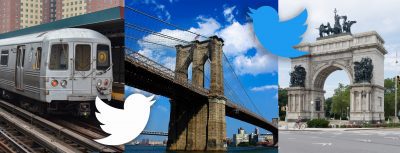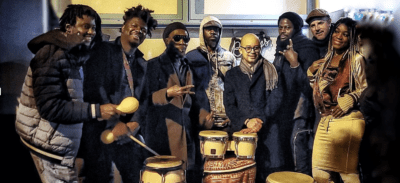Jeffrey Wright is Charged Up: The Award-Winning Actor on Art, Activism, and Westworld
A few months ago, Jeffrey Wright found himself inside the walls of a maximum-security prison in Indiana. In his company is one 34-year-old man serving a 65-year sentence. Nearby stood a second man, serving 170 years. A third, within a stone’s toss, had been on death row for seven years. Another young man was in for life; no opportunity for parole. Correctional officers patrolled the halls. Administrators occupied the facility’s offices. Wright was acting, but everything around him was real.
Wright, who’s made his name portraying historical figures such as Martin Luther King Jr., Muddy Waters, and Jean-Michel Basquiat—along with taking memorable turns in blockbusters like the latter three Hunger Games films and Casino Royale during his 25-year chameleon-like career—was on location for his next film, O.G., which is set to be released next year. Helmed by documentarian Madeleine Sackler, Wright is the headliner, alongside only nine other professional actors. The rest of the cast—inmates, guards, and administrators—are all affiliated with the prison. Wright’s worked in a lot of different places, and with an immense variety of people, but he calls the six straight weeks shooting inside the prison “the most powerful experience I’ve ever had on a film set.”
Wrapping O.G. puts a bow on what the 50-year-old thespian refers to as one of the most meaningful years of his career, which also included stepping into an essential role on HBO’s addictive new series, Westworld (more on that later), and a strong presence in the 2016 presidential election cycle. As so many of his roles have indicated—he played Colin Powell in Oliver Stone’s 2008 Bush biopic, W., for one—the political spectrum has always played a big role in his life; he was even born in Washington D.C. “It’s just everywhere, and it’s in your blood,” he says. “I was born in 1965, right in the middle of the Civil Rights movement, and in the most political town in the country. It got soaked into my DNA—I think politics permeates everything.”
***
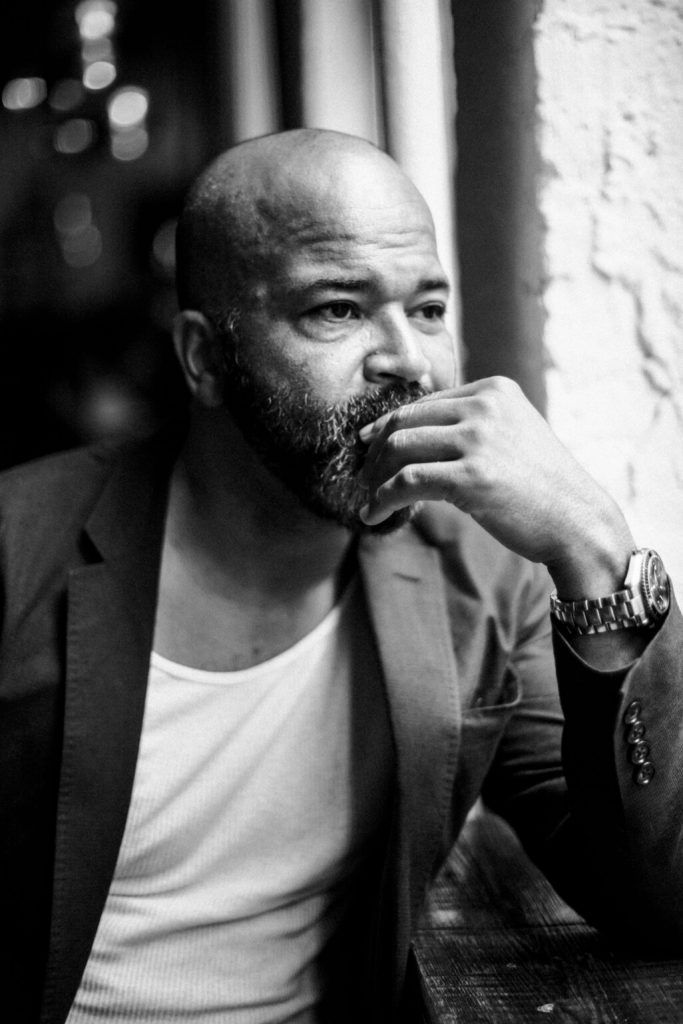 Just two days after attending the final presidential debate in Las Vegas, Wright is back in Brooklyn—just around the corner from his home—for lunch and coffee on a rainy Friday at Smooch Café, a moderately-crowded bistro in Fort Greene. He’s dressed casually—blue blazer over a white undershirt, paired with jeans—after the morning’s crummy weather failed to allow for his typical early surf (presumably in the Rockaways, he likes to do so as often as he can). Afterwards, he’ll be running into Manhattan for some post-production audio work for Westworld, which will air its fourth episode in just two days.
Just two days after attending the final presidential debate in Las Vegas, Wright is back in Brooklyn—just around the corner from his home—for lunch and coffee on a rainy Friday at Smooch Café, a moderately-crowded bistro in Fort Greene. He’s dressed casually—blue blazer over a white undershirt, paired with jeans—after the morning’s crummy weather failed to allow for his typical early surf (presumably in the Rockaways, he likes to do so as often as he can). Afterwards, he’ll be running into Manhattan for some post-production audio work for Westworld, which will air its fourth episode in just two days.
He mentions, at one point, that he got particularly charged up about the election early on, due to Donald Trump’s rhetoric—citing “coded language,” “less-coded language,” “attacks on marginalized people,” and “neo-fascist” behavior. Sitting at a round, cushioned booth in the back of the café, it doesn’t take the actor long to get into his frustration with what he had witnessed just a few days prior.
“I’m looking at this guy, going ‘Wow. If Barack Obama behaved like that buffoon, behaved for one minute of his campaign in 2008, he would have totally disqualified himself in the faces of white people across this country.’ And that guy can stand up there and be the biggest asshole on the planet and still be perceived by some white people in this country as legitimate? And I think that’s amazing—the double standard, and the desperation, and the weirdness of that. It’s just mind-boggling.”
Wright’s tone is stern. Just like the characters he often plays on television and in film, he knows exactly what’s coming out of his mouth and how he conveys it is no accident. His diction is carefully chosen, and he pauses at times to ensure that his message comes across.
Less than a month earlier, he was in North Carolina, stumping for Trump’s opponent, Hillary Clinton. As the founder of Taia Lion Resources, a company established in 2001 and based in Sierra Leone with a focus on establishing ethical and sustainable mining to help the greater good, Wright is deeply familiar both with the challenges of international aid work and with the gains Hillary Clinton has helped accomplish abroad. He knows that there’s a lot to mistrust when it comes to organizations that do work in Africa from the outside.
But, the Clinton Foundation, he says, is different. In Rwanda, it oversaw the construction of hospitals that anyone would be comfortable being treated in. The work was innovative, efficient, and progressive. He’s been attending the Clinton Global Initiative—an annual meeting of global leaders to create and implement solutions to some the world’s most pressing challenges—since 2005, when Bill Clinton established its inaugural convention. He’s even visited Africa, touring South Africa, Mozambique, Rwanda, and Uganda with President Clinton himself. So when Trump, and other conservatives, attempt to attack what Wright refers to as “one of the most forward-leaning” groups, it makes him sick. “Like, are you kidding me?” he asks rhetorically. “Real lives. Real lives are being impacted in measurable ways.”
This isn’t the first presidential campaign that Wright has found himself involved in. In 2007, when then-Senator Obama announced his presidential candidacy, Wright was on hand and motivated. That September, when Obama brought his campaign to New York City, 24,000 people made their way to New York City for the event, and Wright was a featured speaker.
But he wound up working on three films consecutively—Quantum of Solace, Cadillac Records, and W.—and he was often traveling and in far away locations as a result. The plan, at least initially, was to circle back to the Obama campaign once filming was over. But an impromptu wrap party for W. in Shreveport, Louisiana, ended with Wright, costar Josh Brolin, and a few others arrested by what the star referred to as hyper-militarized cops. All charges were eventually dropped, but “After that,” the bearded actor says with a laugh, “the Obama campaign forgot my phone number.”
Wright’s disappointment with the aftermath of the incident in Shreveport (“A town that I would never revisit ever. Yeah. A lot of weird…a lot of Trumpist vibes in that town,” he recollects) led to a desire to bounce back; hence his exceptional excitement for 2016, both in supporting Hillary Clinton and rejecting and deconstructing Donald Trump.
***
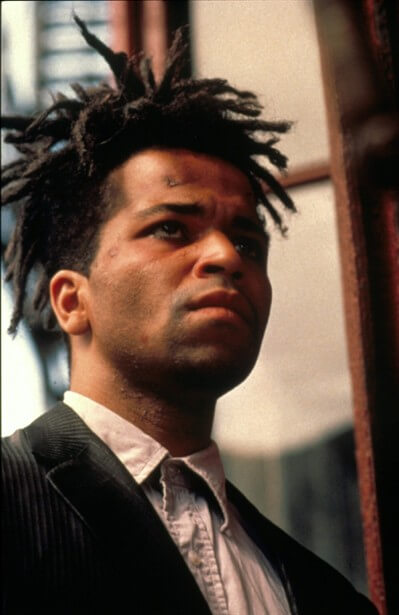

Wright first moved to New York City over 1988’s 4th of July weekend—only a few weeks before a drug overdose ended Basquiat’s life. Wright was living in an apartment at the intersection of Avenue D and 10th Street—“pretty deep back then,” as he says. He had a roommate whose girlfriend was using at the time. For his own part, Wright was biding his time until he began at NYU in September, biking around the city, hanging out at the apartment.
Years later, after Basquiat was released, Wright ran into this old roommate at a party. “You had no idea!” she told him, aghast. That summer before NYU, her girlfriend would often run into Jean-Michel Basquiat, the man Wright would eventually portray on screen. There was a drug dealer down on the first floor that the artist would often link up with.
“I couldn’t believe it,” the roommate told him. “You were right there, and he was right here, and you guys had no idea! And you never met.”
Wright worked consistently throughout the 1990s and 2000s, but began to do smaller roles after his children were born. He wanted to pay the bills, but not be away so long, while continuing the work he began in Sierra Leone. This step back prompted a look at the business of movie making, and Wright found much to be unwelcoming and disillusioning. “In some of the stuff I did, my work was pretty half-assed, you know?” He cited The Invasion and Lady In The Water as a couple of examples. “Sometimes you play different types of music.”
***
“Bring her back online.”
Those are the the first words anyone hears in Westworld—HBO’s new sci-fi/Western supershow—and they come from the voice of Wright’s character, Bernard Lowe. To say that Bernard is central to the plot would be an understatement: he’s described his character as “Sherlock Holmes,” and “a looking glass for the audience.” In a show with so many storylines, he’s often at the center of the web in the massive world of the show.
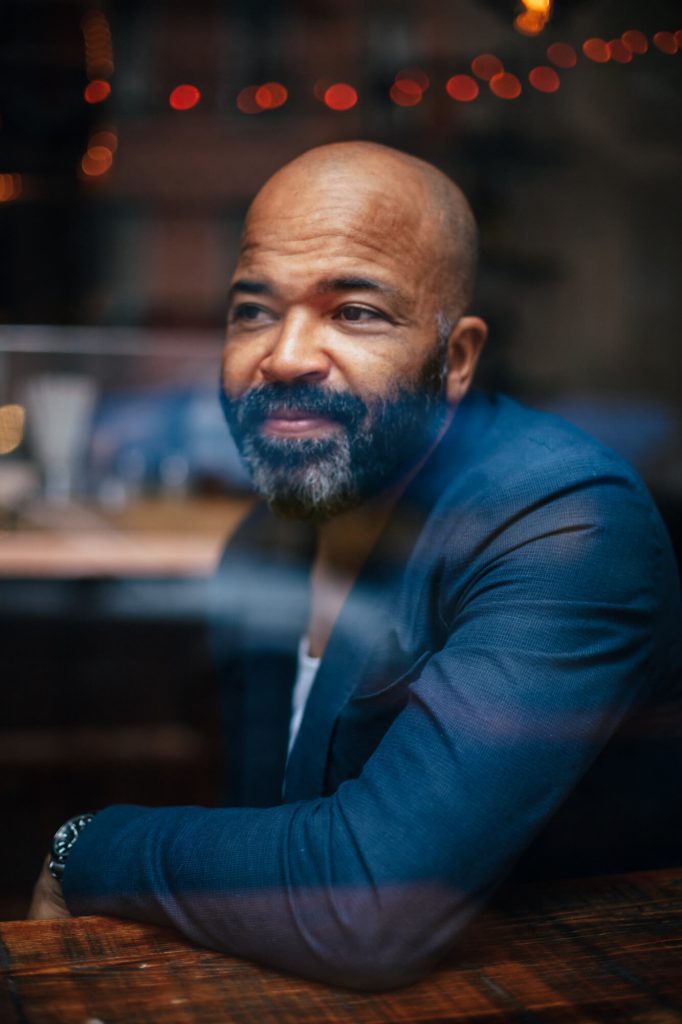

“I came in, in, like, the fourth quarter, you know? Gimme that ball! Let me spike that ball!,” he says, laughing about his transcendent villainous turn as Dr. Valentin Narcisse on Boardwalk, one of the show’s final antagonists. “Everybody else had done the hard work of making it a successful show. So it was really exciting for me to take the risk of being at the start of a beast like Westworld because of those experiences.”
Wright watched the original 1976 film—starring Yul Brynner, detailing the horror of a western-themed park going awry— in his preparation for the series. And while he acknowledges that the premise to the Michael Crichton-directed movie is brilliant, Wright believes it underachieved. “Crichton was a brilliant thinker and writer, but he wasn’t Francis Ford Coppola as a director. You know? And to revisit it with a different set of eyes, and with technology having moved on 40 years since, I think does a real service to his idea.”
Throughout the interview, the actor texts Luke Hemsworth, who plays Stubbs, the head of security on Westworld. The two had met prior to working on the show, as Hemsworth’s brother, Liam, was one of the leads of the Hunger Games series. But now as the two share many scenes, along with a love for surfing, they’ve found common ground and have continued to talk even after wrapping the first season of the show in May.
Hemsworth is thrilled at the opportunity to work with Wright. “He’s amazing. He’s so still and charismatic all in one, rolled into one beautiful, subtle exploration. His little shifts between scenes, it’s just amazing to watch,” the Australian actor said over the phone. “It’s really a blessing to stand next to someone of Jeffrey’s calibur, and go over these incredibly dense, layered scenes with him, and pick them apart. It’s an actor’s dream, and on top of that he’s a very gracious, giving human being. He’s a champion of the little people, he’s very politically motivated, and he doesn’t suffer any fools, either. Legend. Champion. And he can sort of surf.”
Westworld has already caught the attention of fans and conspiracy theorists alike; the internet is filled to the brim with this theory, that theory, and another theory, that hey, maybe it’s pretty out there, but you never know. Wright is super active online, so he’s heard many of them. “The response that we’ve seen from the audience thus far kind of mirrors what we were going through while making it,” he said. “We love it. “
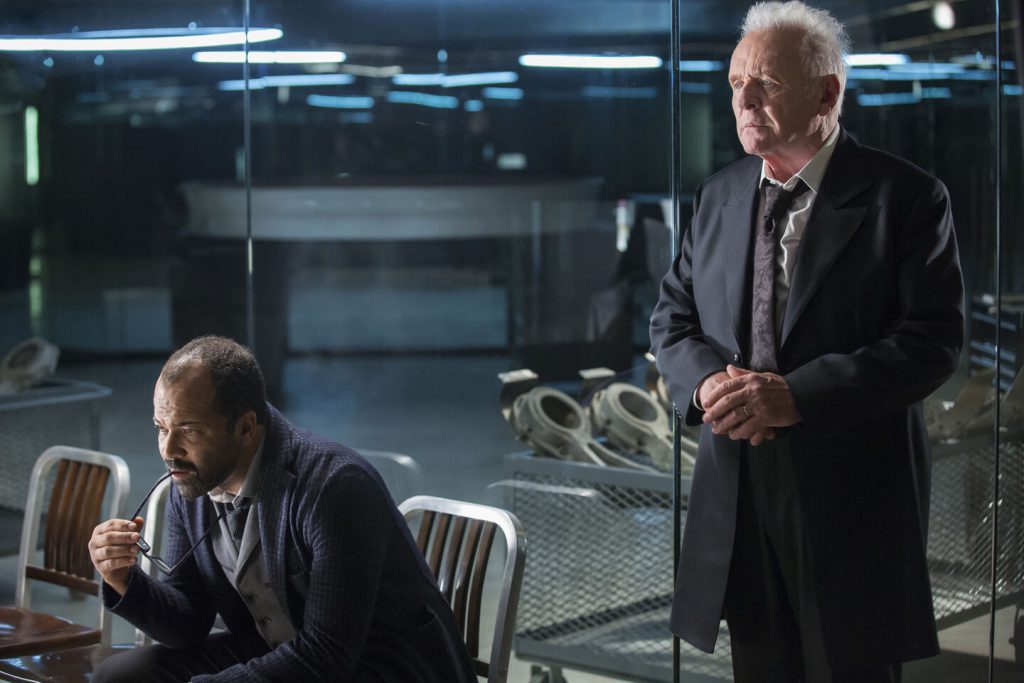

A show like Westworld is not exactly uncharted territory for Wright but, as he notes, he’s never been involved with something of this magnitude from the very beginning. And what an auspicious one—from producer J.J. Abrams, to showrunners Jonathan Nolan and Lisa Joy, to costars Evan Rachel Wood, Ed Harris, James Marsden, oh, and a guy you may have heard of named Anthony Hopkins, with whom Wright gets to share more scenes with than any other performer. (“You couldn’t ask for a more engaged partner,” Wright says of Hopkins, putting him alongside Christopher Walken, Savion Glover, and Al Pacino on the “top shelf” of performers he’s worked with). This is an exceptional cast, even by HBO’s standards.
And, in the end, that’s the reason why Wright decided to sign on.
“Yeah, this is where I want to be. It was easy,” he said. “And in the best of times, that’s how I choose work, because it’s all about collaboration. And if you’re in bed with a bunch of bums, it’s no fun.”
Original photos by Nicole Fara Silver
Westworld photo courtesy of HBO, Baquiat photo courtesy of Miramax
You might also like 














